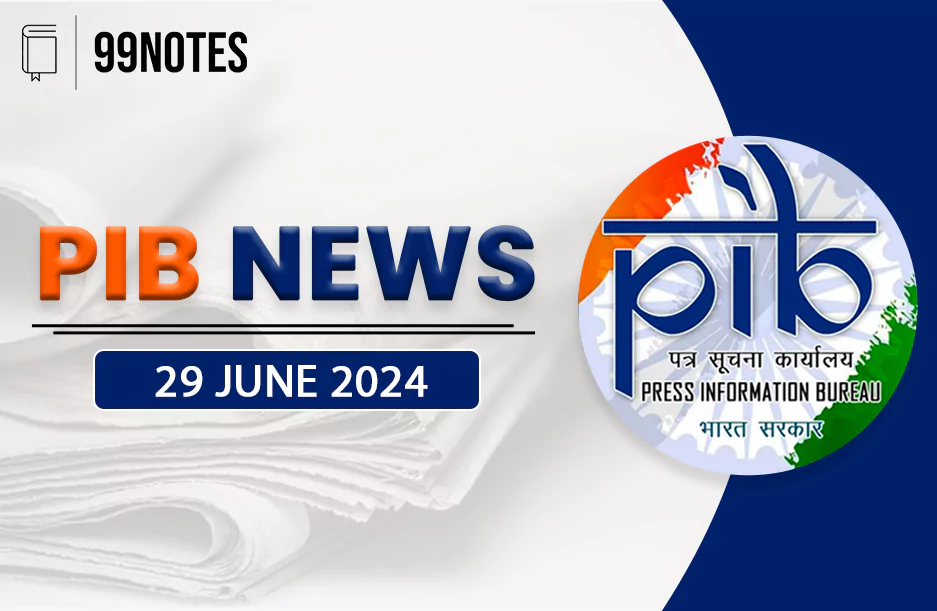29 June 2024 : PIB Summary For UPSC
1. Prime Minister congratulates H.E António Costa on being elected as President of the European Council
(Source – https://pib.gov.in/PressReleseDetail.aspx?PRID=2029399 )
| Topic: GS2 – International Relations |
| Context |
|
The European Council:
The European Council is an institution of the European Union (EU) that plays a crucial role in shaping the EU’s overall political direction and priorities.
Here are key points about the European Council:
- Composition: Comprises the heads of state or government of EU member states, along with the President of the European Council and the President of the European Commission.
- Role: Sets the EU’s political agenda, provides impetus for integration initiatives, and resolves issues that cannot be resolved at lower levels of governance.
- Decision-Making: Decisions are made through consensus or qualified majority voting, depending on the issue at hand.
- Meetings: Regular summits are held at least four times a year, chaired by the President of the European Council. Extraordinary meetings can be convened to address urgent issues.
- Functions: Defines general political guidelines and priorities of the EU, including economic policies, security and defence cooperation, external relations, and strategic initiatives.
- Relationship with Other Institutions: Works closely with the European Parliament and the Council of the European Union (Council of Ministers) to ensure legislative and executive coherence within the EU.
- Impact: Plays a pivotal role in shaping EU policies and responses to global challenges, reflecting the collective interests and aspirations of its member states.
Overall, the European Council acts as a central forum for EU leaders to discuss and coordinate on matters of critical importance, ensuring unity and coherence in the Union’s actions and policies.
| PYQ: ‘Indian diaspora has a decisive role to play in the politics and economy of America and European Countries’. Comment with examples. (150 words/10m) (UPSC CSE (M) GS-2 2020) |
| Practice Question: Discuss the strategic significance and future prospects of India-European Union relations in the context of global geopolitics. (250 Words /15 marks) |
2. Union Minister Dr. Jitendra Singh launches two Geoportals
(Source – https://pib.gov.in/PressReleseDetail.aspx?PRID=2029385 )
| Topic: GS2 – Governance |
| Context |
|
Bhuvan Panchayat (Ver. 4.0):
- Purpose: Facilitates rural land record management and decentralised planning.
- Technology: Provides high-resolution satellite imagery at 1:10K scale for detailed visualisation.
- Empowerment: Aims to empower citizens at the grassroots level, particularly in Panchayats, by providing real-time data.
- Objectives: Supports Space-based Information Support for Decentralised Planning (SISDP).
- Benefits: Reduces dependence on local administration, promotes transparency in land record management, and enhances efficiency in land revenue management.
Bhuvan Panchayat (Ver. 4.0) represents a significant step towards digitalizing and modernising rural governance through accessible and accurate geospatial information.
National Database for Emergency Management (NDEM Ver. 5.0):
- Purpose: Provides space-based inputs for disaster management and risk reduction.
- Scope: Covers natural disasters in India and neighbouring countries.
- Technology: Utilises advanced geospatial tools to monitor and manage emergencies.
- Features: Offers early warning systems and real-time data for proactive disaster prevention.
- Impact: Enhances disaster preparedness, response, and recovery efforts through integrated command centres.
NDEM Ver. 5.0 signifies India’s commitment to leveraging space technology for improving emergency response capabilities and minimising the impact of natural disasters across the region.



